Community Connection
Building Community and Understanding Around Citizen: An American Lyric
The Community Reading Project (CRP), a signature event for the Office of Integrative Learning and Advising within Brooks College, is a way of stimulating campus-wide conversation around a single text. Throughout the year, the CRP includes a number of on- and off-campus events that engage students and faculty, staff, and community members in conversation around the ideas of that year’s chosen text.
For the past 11 years, a committee of Grand Valley faculty and staff members, in consultation with Herrick Library in Holland (which co-hosts the event in Holland), has selected a book for the Community Reading Project. Criteria to select a book include cultural resonance within American culture, connection to the university’s values, and wide appeal to students and faculty and staff members in a variety of disciplines. A year’s worth of programming is planned, leading to the author’s visits.
The 2015-2016 text, Citizen: An American Lyric by Claudia Rankine, brought a different feel to the CRP. It was a collection of prose, poetry, and images that recount racial aggressions, unintentional or not, that occur daily to people of color. About 80 faculty and staff members used this book in their classes or small group discussions.
In her book, Rankine writes about celebrities and ordinary people of color who experienced racial aggressions, like tennis star Serena Williams and the racial slurs she endured from fans and competitors on the court, and an unknown woman who switches airplane seats with her daughter because her daughter doesn’t want to sit next to a person of color.
Citizen: An American Lyric won the National Book Critics Circle Award for Poetry and was a finalist for the 2014 National Book Award in Poetry, among other literary honors.
In a review, Publishers Weekly said Rankine’s book “inspires sympathy and outrage, but most of all a will to take a deep look at ourselves and our society.”
By partnering with the Robert and Mary Pew Faculty Teaching and Learning Center, the Office of Integrative Learning and Advising hosted a series of lunch and learn discussions about the book. In conjunction with the CRP, the theatre program presented Twilight, Los Angeles: 1992, a compilation of 300 interviews playwright Anna Deavere Smith conducted following the L.A. riots after the acquittal of four police officers charged with assaulting Rodney King.
A CRP discussion was held on March 24 in the Kirkhof Center, Pere Marquette room. This presentation was in conjunction with the Kutsche Office of Local History’s annual roundtable. Todd E. Robinson, author of A City Within a City: The Black Freedom Struggle in Grand Rapids, Michigan, led discussion about the types of racial issues addressed in Citizen: An American Lyric that have shaped West Michigan cities. Published in 2012, A City Within a City focuses on the struggles of school integration and racial inequality in Grand Rapids after World War II and through the civil rights era.
Author Claudia Rankine visited the Meijer Campus in Holland on April 6 and the Allendale Campus on April 7. Rankine gave presentations about her book, Citizen: An American Lyric, and was available for book sales and signings.
“This book was one that challenged one’s space,” said Grand Valley President Thomas J. Haas. “This is a book that should make us uncomfortable in many regards. I’m thrilled that we’re able to use the opportunity to stretch ourselves, the essence of liberal arts, and the essence of our mission, as well.”
Rankine also highlighted the many photos throughout her book and talked about their corresponding stories. After discussing her book, Rankine concluded her lecture by showing a video she helped create with filmmaker John Lucas. The video featured Rankine’s voice reciting a poem over clips of video showing Tamir Rice, Sandra Bland, and other victims of police brutality.
“The problem with this book was that for me, I had no idea how to end it,” Rankine said. “I didn’t want to create an ending that seemed like it was an actual ending to the concerns of the book.”
Rankine ended the book with an example from her recent life. She was sitting in her car before a tennis match, and a white woman pulled into the spot facing Rankine. Upon seeing Rankine sitting in her car, the woman started her car and moved it to a different spot. “You don’t have to have someone tell you when something is wrong,” she said. “It’s only as you come up close and begin to really look at what it looks like, that you understand what is happening.”
The lecture ended with the announcement of next year’s Community Reading Project selection, True American by Adnan Giridharadas.
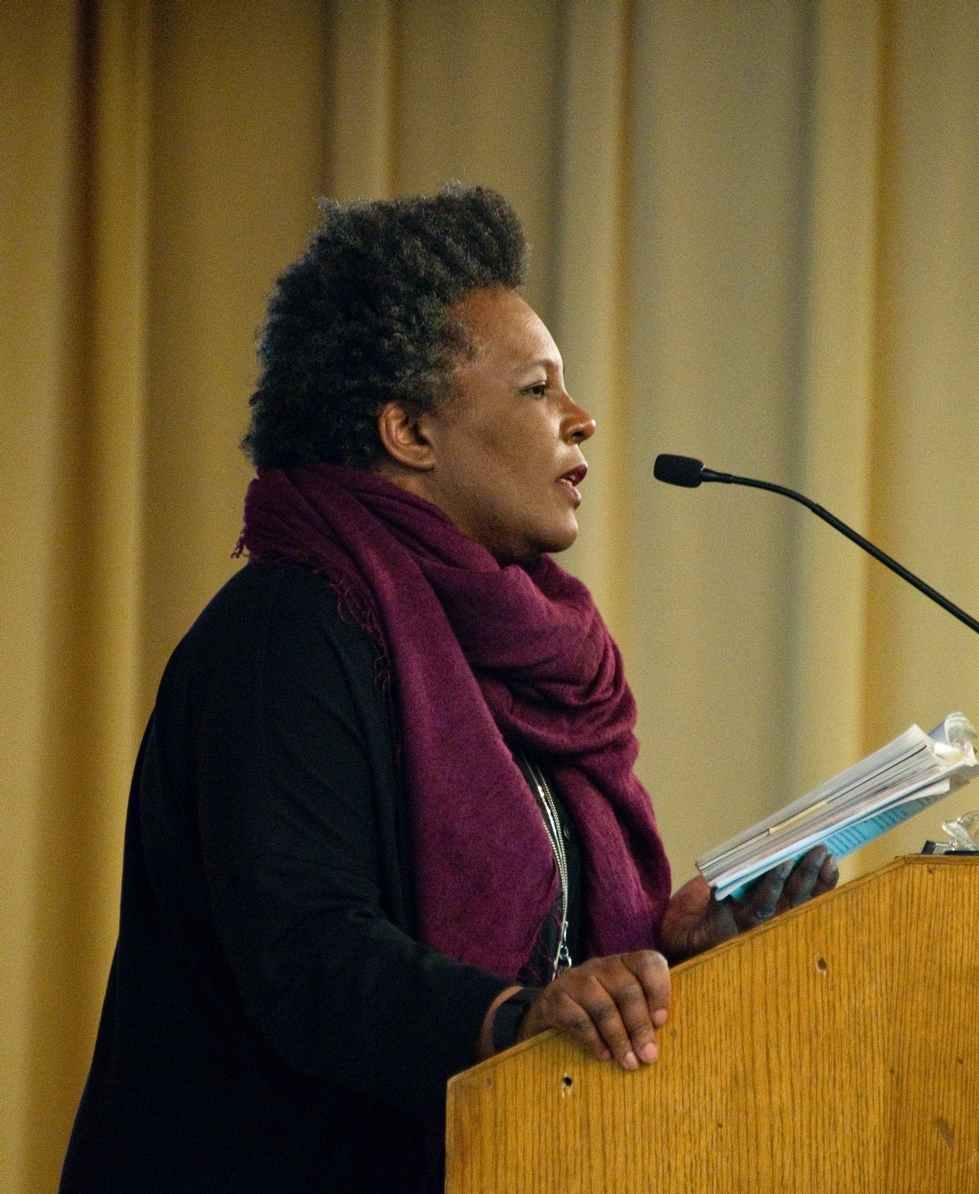
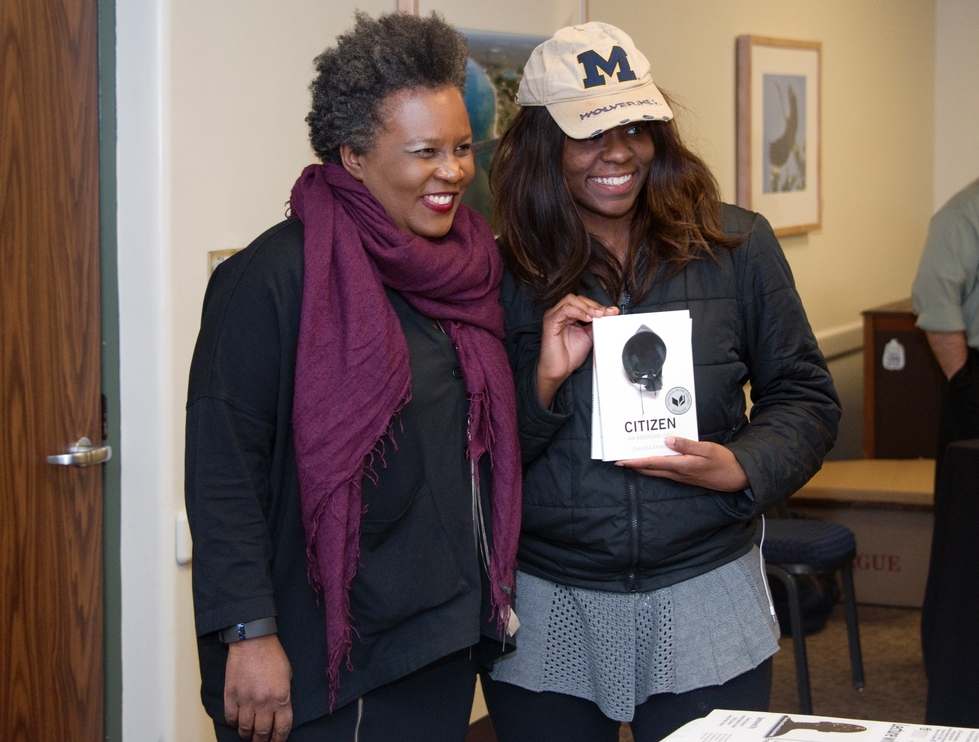
Brooks College Program Secures NEH Grant for Oral History Project
The Kutsche Office of Local History received an $11,500 Common Heritage Grant from the National Endowment for the Humanities (NEH) to collect oral histories of Michigan migrant workers.
The office is working in partnership with the Oceana County Hispanic Center and the Oceana County Historical and Genealogical Society, in addition to Grand Valley’s history department and Latin American studies program, the latter of which also resides in the Brooks College. The grant is matched by Grand Valley for a project totaling $23,000.
Melanie Shell-Weiss, director of the Kutsche Office of Local History and associate professor of liberal studies, said the project Growing Community: A Century of Migration in Oceana County will build on work completed by Andy Schlewitz, assistant professor of Latin American studies and political science, and Nora Salas, assistant professor of history, to collect oral histories and digitize photos and materials from migrant families.
Michigan has the fifth largest migrant population in the country, yet Shell-Weiss said young children in Oceana County know little of their families’ histories and are less likely to see themselves as community members, despite having deep roots in the area through multiple generations.
“Non-Latino residents are also less likely to understand the deep history of their Latino neighbors or their shared community ties,” Shell-Weiss said. “For these reasons, the opportunity to invite Latino community members — migrant and year-round — to preserve their oral histories and photographs would be of tremendous benefit to Oceana County.”
The NEH announced its Common Heritage Grants on December 14, 2015, to support projects that preserve heritage and promote scholarly discoveries. “We are proud to announce this latest group of grantees, who, through their projects and research, will bring valuable lessons of history and culture to Americans,” said William D. Adams, NEH chair.
Oceana County collections began in January 2016 and the materials are shared with families and individuals who participate.
The Kutsche office, in collaboration with the Meijer Campus in Holland, the City of Holland, Herrick District Library, Latin Americans United for Progress, and St. Francis de Sales Catholic Church also recently completed “Nuestra Comunidad Hispana” an oral history collection of Latino residents in Holland.
The mission of the Kutsche Office of Local History is to “give voice to diverse communities through history.” It does so by sponsoring programs that engage students and faculty and staff members with community members to preserve and make publicly accessible the historical stories of those communities.
[1478027895].jpg)
7th Annual Roundtable Engages Professionals, Community Members, and Students Around Issues of Preservation and Access to History
The Kutsche Office of Local History hosted the 7th annual Local History Roundtable on Thursday, March 24, 2016, at the Mary Idema Pew Library in Allendale. This year’s topic, Changing Communities, highlighted how diverse populations have changed West Michigan. The daylong event hosted its largest audience since its inception and included two keynote presentations and a panel discussion. The Kutsche office also honored a local historian for her work. Because it was held at Grand Valley, many students were able to attend the conversations throughout the day, giving them a better understanding of how professionals and community groups involved in preserving and sharing local history do their work.
This year’s keynote speakers were Todd Robinson, author of A City Within A City: The Black Freedom Struggle in Grand Rapids, Michigan, and Tim Gleisner, head of the Grand Rapids Public Library’s local history department and special collections. Robinson’s book, chosen as Grand Rapids’ book of the year by Mayor Rosalynn Bliss, focuses on the struggles of school integration and racial inequality in Grand Rapids from WWII to the civil rights era. Gleisner spoke more broadly about population changes in Grand Rapids. A panel discussion followed with Delia Fernandez, assistant professor of history at Michigan State University, who spoke about Puerto Rican and Mexican influences in the city.
At the event, H. Sook Wilkinson, a historian from Bloomfield Hills, received the second Gordon Olson Lifetime Contributions to Local History award. The award is named for Olson, former Grand Rapids city historian. Criteria for receiving the Olson award includes contributions to local history that give voice to diverse communities. A Korean adoptee herself, Wilkinson has
written several books on the experiences of adoptees and has chaired the Governor’s Advisory Council on Asian Pacific American Affairs, as well as the new Michigan Pacific American Affairs Commission. She also serves on the Board of Trustees for Northern Michigan University.
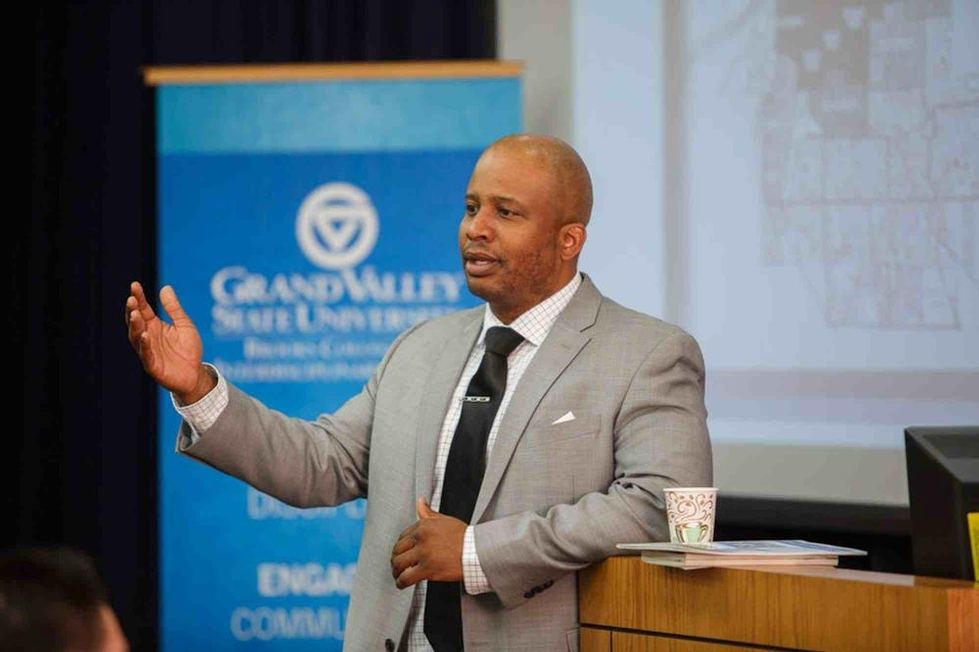
Meijer Lecturer Ties Digital Revolution to Liberal Education
The Frederik Meijer Lecture Series for the winter semester sent participants away thinking of their place in the digital revolution.
Ryan McManus, founder of Accenture’s Digital Business Strategy, was the speaker at the February 23 event held at the L. William Seidman Center. A regular speaker and teacher on digital and global business strategy, McManus has counseled clients since the mid-1990s.
Jeffrey Chamberlain, director of the Frederik Meijer Honors College, said McManus told the audience they need to understand the digital world — even computer coding — to be an active participant in the world.
“He coupled this emphasis on the digital with liberal education and global understanding,” Chamberlain said. “So, to be educated for the world today and the future, one should be broadly trained, should understand different cultures, and should grasp digital processes.”
Chamberlain said students who attended the lecture appreciated McManus’ approach to the importance of a liberal education.
The Frederik Meijer Lecture series was established to provide local and national presentations that focus on issues of leadership, innovation, and entrepreneurship from the perspective of students, faculty members, and participants in business throughout West Michigan. It is organized each year by the Frederik Meijer Honors College.
Middle School Students in IChallengeUth Program Pitch Awareness Campaign for SAP
The Sustainable Agriculture Project (SAP), the two-acre farm on the edge of the Allendale Campus that is host to a number of courses and student organizations, is often a site of community outreach within the Brooks College. As a site where students and faculty can teach, learn, research, and work, it is a showcase for understanding how interdisciplinary problem solving happens.
In the summer of 2015, a team of middle school students from Ottawa County spent a week learning at the SAP, charged with a challenge to collaborate on a project to increase awareness of the site among students and faculty and staff members at Grand Valley.
The IChallengeUth program is sponsored by the Ottawa Area ISD. The Center for Adult and Continuing Studies at Grand Valley’s Meijer Campus in Holland is instrumental in setting up the event. Teams of seventh and eighth graders are sent to host organizations to work on a real-world problem specific to that organization — a perfect fit with the experiential-learning purpose of the SAP.
Yumiko Jakobcic, campus sustainability coordinator, said the students spent each day at the farm doing chores and learning more about its process.
They pitched their problem-solving idea on August 13 to faculty and staff members. IChallengeUth will run again in the summer of 2017.
Their idea to create awareness of the farm on campus is to host a Farmfest in October, inviting the campus community and the public. The team suggested hayrides, games, food samples, and invitations to begin Community Supported Agriculture (CSA) shares.
The team was led by teachers Heather Dickerson from Creekside Middle School in Zeeland and Lindsay Cherry from Harbor Lights Middle School in the West Ottawa district.
Participating students were Kyelar Golisch, Alaina Lang, Emily Siler, and Sam Tanner from Jenison Junior High; Lexi Tater from Lakeshore Middle School; Shane Vaara from Harbor Lights Middle School; and Eli Sierra from Mac Bay Middle School.
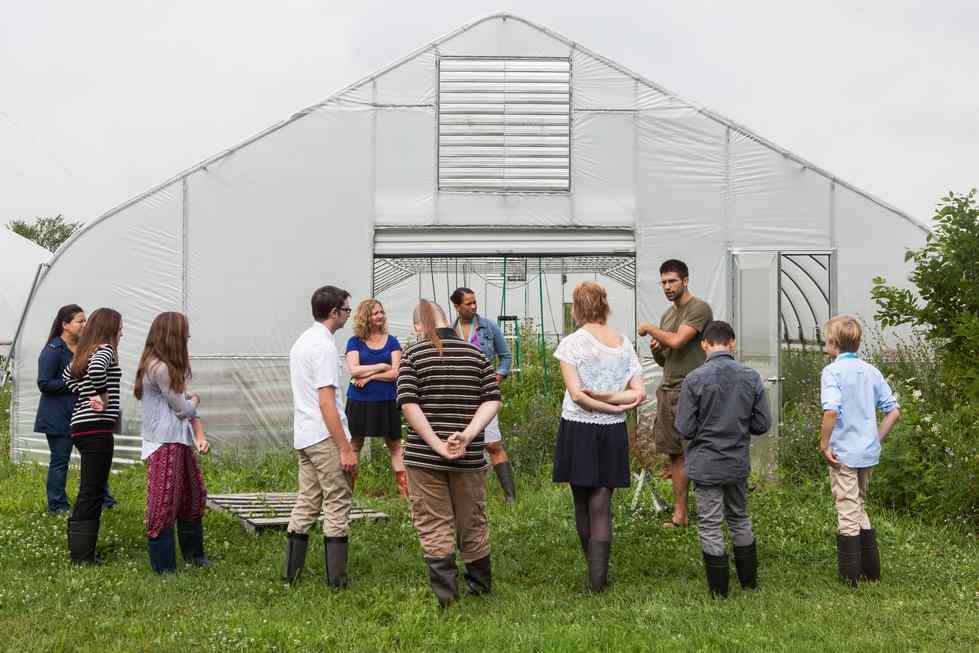
Former Mayor Takes Position in Brooks College
Former Grand Rapids Mayor George Heartwell joined Grand Valley State University’s sustainability team in February.
Heartwell serves as community sustainability coordinator, a part-time position, for the Office of Sustainability Practices in Brooks College. Heartwell’s 12-year tenure as mayor ended December 31, 2015.
In his new role, Heartwell’s work furthers Grand Valley’s goals in the areas of sustainability and civic engagement, and he serves as a resource for students. He continues to chair the Grand Rapids Community Sustainability Partnership and Grand Rapids Regional Center of Expertise in Education for Sustainable Development.
“George’s dedication to advancing the sustainability practices of Grand Rapids is unwavering and I look forward to him bringing the same energy to Grand Valley,” said Grand Valley President Thomas J. Haas. “His expertise and experiences will help Grand Valley continue as a leader in sustainability and partner of the City of Grand Rapids.”
Anne L. Hiskes, dean of Brooks College, said as soon as it was known that Heartwell’s term would end, she contacted him to explore opportunities to bring his expertise to Grand Valley. “I cannot think of an individual with a richer experience in sustainability, social innovation, and community engagement,” said Hiskes.
Heartwell said he is honored to join Grand Valley.
“I look forward to bringing to Grand Valley my passion for sustainability, the broad network of relationships I cultivated during my time in public office, and my love of West Michigan,” Heartwell said.
Grand Valley is a leader in sustainability. The university has been nationally recognized for its best practices and culture by The Princeton Review, Sierra Club, and U.S. News and World Report in their best colleges rankings.
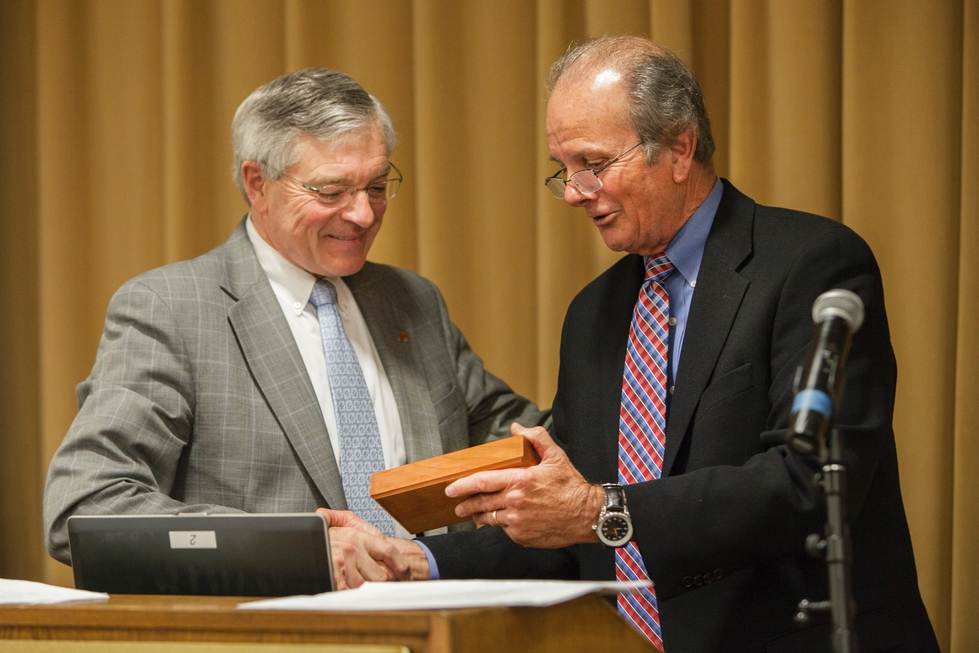
Lake Michigan Writing Project Supports K-12 Teachers and Young Writers
Nearly 20 area educators participated as fellows in the Lake Michigan Writing Project Summer Institute, held in June and July. This annual program is key to helping K-12 teachers improve their teaching of writing, and thus students’ learning, and is the cornerstone of this local National Writing Project site’s activity.
Lindsay Ellis, director of the Lake Michigan Writing Project (LMWP), who also serves as an associate professor of English and director of Writing Across the Curriculum at Grand Valley, said the institute drew science and English teachers from the early childhood level through college. The institute was co-led by Kari Reynolds, an elementary teacher from Belding; Susan Mowers, chair of English at Grand Rapids Community College; and Ellis.
“Collaboration by a diverse group of educators allows us to write instruction developmentally across subject areas,” Ellis said.
Erinn Caley, a Byron Center High School teacher, was an institute fellow in 2015 and said the experience was a game changer for her in how she will continue to teach writing.
“This experience also has reminded me of how writing feels,” Caley said. “If I don’t value writing in my own life, how can I ask students to value it in theirs?”
Ellis began the 2015-2016 academic year by leading a professional development workshop for teachers at Reeths-Puffer Schools in Muskegon. One day was dedicated to English language arts teachers and the second day was for science and history teachers.
“We applied classical rhetorical theory to the teaching of writing about current events across subject areas,” she said. Laker Writing Camps, for students in third through 12th grade, offered participants the opportunity to write, share, and collaborate on projects. Seven undergraduate students and one graduate student from Grand Valley assisted at the camps.
Symposium Supports Community Dialogue on Sustainability
The fifth annual Women and the Environment Symposium provided opportunities for community members to discuss the leadership roles of women in the environment movement.
The Office of Sustainability Practices partnered with Grand Valley Women’s Center and West Michigan Environmental Action Council (WMEAC) to develop and host the event February 24 in the Richard M. DeVos Center.
“Students who attended the symposium had an opportunity to participate in panels with local and regional experts, hear a nationally known keynote speaker, and network with professionals, community activists, and academics from around the region,” said Yumiko Jakobcic, campus sustainability coordinator for the Office of Sustainability Practices.
The keynote speaker was Jacqui Patterson, director of environmental and climate justice for the National Association for the Advancement of Colored People. The event also featured networking and two panel discussions focusing on women’s leadership for climate justice and leadership in communities of faith.
WMEAC Executive Director Rachel Hood said, “The symposium is an inspiring event that helps us understand how to protect our health and quality of life in the Great Lakes for our families and communities.”
Through this conference, held annually over the past five years, Grand Valley and WMEAC have been able to bring together hundreds of students and community members to discuss, debate, and learn about a variety of environmental issues that impact people’s lives.
